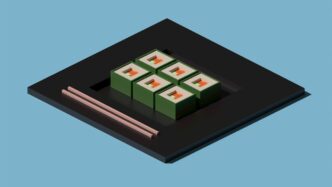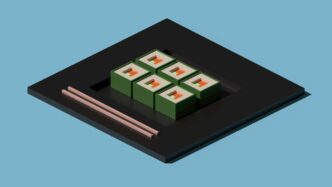So, Oxford Quantum Circuits, or OQC as they’re known, just dropped a pretty big announcement about their plans for the next decade. They’ve laid out a roadmap that goes all the way to 2034, and it sounds like they’re aiming for some serious progress in quantum computing. It’s not just about building more qubits; it’s about building *better* qubits, the kind that can actually do useful things. They’re talking about moving beyond the messy, error-prone physical qubits we have now and getting to the more reliable logical qubits. This could really change how we approach problems in areas like cybersecurity and drug discovery, and it’s pretty exciting to see a UK company making such bold moves.
Key Takeaways
- Oxford Quantum Circuits (OQC) has revealed a roadmap aiming for 200 logical qubits by 2028 and a massive 50,000 logical qubits by 2034, pushing towards practical quantum computing.
- The company highlights a significant advantage in physical-to-logical qubit efficiency, claiming a 10x improvement over current methods, which is key for scaling.
- OQC’s plans target impactful applications in fraud detection, cybersecurity, drug discovery, and finance, with a focus on early commercial use.
- The roadmap emphasizes a transition from physical qubits to more stable logical qubits, a necessary step for reliable quantum computations and error correction.
- OQC’s technology features compact designs and high-fidelity gates, aiming for speed and accuracy to gain a commercial edge in the quantum race.
Oxford Quantum Circuits’ Ambitious Qubit Targets
Oxford Quantum Circuits (OQC) has laid out a pretty bold plan for where they see quantum computing going, and honestly, it’s a big deal for the whole field. They’re not just talking about incremental improvements; they’re aiming for some serious numbers in terms of qubits, which are basically the building blocks of quantum computers.
Journey to 200 Logical Qubits by 2028
First off, OQC wants to hit 200 logical qubits by 2028. Now, this isn’t just about cramming more physical qubits together. Logical qubits are the real prize because they’re error-corrected. Think of it like building a sturdy house versus just stacking a bunch of bricks. These logical qubits are what will actually let us run complex calculations reliably. Getting to 200 of them by 2028 means they’re aiming for early applications, especially in areas like financial services and cybersecurity, where even a small quantum advantage could be huge. It’s a significant step towards making quantum computers useful for real-world problems.
Scaling to 50,000 Logical Qubits by 2034
But they’re not stopping there. The big target is 50,000 logical qubits by 2034. That’s a massive leap, and it’s a number that really puts them ahead of many other roadmaps out there. Reaching this scale is what will truly transform entire industries. Imagine tackling problems in drug discovery or materials science that are currently impossible. This kind of scale is what many believe is needed for truly fault-tolerant quantum computing, the kind that can solve problems far beyond what even the best supercomputers can do today. It’s a long-term vision, but one that OQC seems committed to.
OQC’s Advantage in Physical-to-Logical Qubit Efficiency
What’s interesting is how OQC claims they can get there. They say their approach needs about ten times fewer physical qubits to create one logical qubit compared to other methods. That’s a pretty big efficiency gain. If you need fewer physical qubits for the same number of error-corrected logical qubits, it makes the whole scaling process much more manageable and cost-effective. This efficiency is key to their strategy for transitioning to the logical era of quantum computing. It’s like having a more fuel-efficient engine for your quantum car – you can go further with less.”
Transformative Applications Driven by Oxford Quantum Circuits
So, what does all this qubit talk actually mean for us? Well, Oxford Quantum Circuits (OQC) isn’t just building fancy machines for the sake of it. They’re aiming to tackle some seriously big problems across different industries. It’s pretty exciting stuff, honestly.
Impact on Fraud Detection and Cybersecurity
Think about how much data is flying around these days. Keeping it secure and spotting dodgy activity is a massive challenge. Quantum computers, especially with the kind of scale OQC is planning, could really shake things up here. They might be able to sift through massive datasets way faster than anything we have now, spotting patterns that signal fraud or cyber threats that we’d totally miss. This could mean a big leap forward in keeping our digital lives safe. It’s like having a super-powered detective for the internet.
Advancements in Drug Discovery and Quantum Chemistry
Developing new medicines and understanding how molecules behave is incredibly complex. It involves a lot of trial and error, which takes ages and costs a fortune. Quantum computers could change that by simulating molecular interactions with amazing accuracy. This means scientists could test out potential drug candidates virtually, speeding up the discovery process significantly. Imagine finding cures for diseases much faster – that’s the kind of impact we’re talking about. OQC’s work could really help advance drug discovery.
Commercial Opportunities in Finance and Defense
Beyond security and health, there are huge commercial possibilities. In finance, quantum computing could optimize investment portfolios, improve risk analysis, and even speed up financial modeling. For defense, it could lead to better logistics, more secure communications, and advanced simulation capabilities. These are areas where even small improvements in speed and accuracy can make a massive difference. It’s not just about theoretical science; it’s about practical, real-world advantages that could reshape entire sectors.
The Transition to the Logical Era of Quantum Computing
We’re seeing a big shift in how quantum computers are being talked about. For a while, the focus was all on the number of physical qubits – those basic building blocks. But that’s changing. The real game-changer is moving towards logical qubits.
Moving Beyond Physical Qubits
Think of physical qubits like individual, somewhat unreliable workers. They’re easily affected by noise and errors, making them tricky to use for complex tasks. To get anything useful done, you need a lot of them, and even then, the results can be messy. The industry is realizing that just adding more physical qubits isn’t the whole story. It’s like trying to build a skyscraper with bricks that keep crumbling – you need a better way to build.
The Significance of Error Correction
This is where logical qubits come in. They’re not just single physical qubits; they’re groups of physical qubits that work together, using clever error correction techniques. This makes them much more stable and reliable. It’s like having a team of those workers, but with a supervisor constantly checking their work and fixing mistakes. This error correction is what will allow quantum computers to actually solve the really hard problems that are currently out of reach for even the best supercomputers. It’s the key to making quantum computing practical for real-world applications, moving us from noisy experiments to dependable computation. We’re seeing progress in this area, with groups demonstrating techniques like logical-level magic state distillation on neutral-atom systems [July 15, 2025QuEra, Harvard, and MIT Researchers Demonstrate Logical-Level Magic State Distillation on a Neutral-Atom Quantum Computer].
OQC’s Role in Enabling Fault-Tolerant Systems
Companies like Oxford Quantum Circuits (OQC) are really pushing this transition. They’re not just aiming for more qubits; they’re focused on creating efficient logical qubits. OQC claims their approach needs significantly fewer physical qubits to create a stable logical qubit compared to others, which is a pretty big deal for scaling up. They’re also hitting impressive speeds and accuracy with their quantum gates, which is vital for running the complex algorithms needed for fault-tolerant systems. This focus on efficiency and accuracy is what will help bring about the next generation of quantum computing, making it accessible for things like advanced financial modeling or discovering new medicines. It’s a complex journey, but one that promises to reshape technology as we know it, much like how advancements in AI are changing industries today [0ff8].
OQC’s Technological Edge and High-Fidelity Gates
So, Oxford Quantum Circuits (OQC) isn’t just talking about building bigger quantum computers; they’re really focused on making them good. Their whole approach seems to be about getting the best performance out of each qubit, which makes a lot of sense when you think about how tricky this whole quantum thing is.
Compact and High-Fidelity Architectures
What’s interesting is how OQC is designing their systems. They’re going for architectures that are not only compact but also aim for really high fidelity. This means the qubits themselves are less prone to errors. Think of it like building with really precise LEGO bricks instead of ones that are a bit warped. This precision is key to making quantum computers reliable enough for real-world tasks. They’re not just cramming more qubits in; they’re making sure the ones they have are top-notch.
Fastest and Most Accurate Quantum Gates
OQC is making some serious noise about their gate speeds and accuracy. They’ve managed to get a two-qubit fidelity of 99.8%, and they’re doing it in just 25 nanoseconds. That’s incredibly fast and accurate. Why does that matter? Well, faster gates mean you can run more complex calculations. It’s like having a super-fast processor in your computer; it just gets more done. This speed and accuracy are what will let them scale up and actually use these machines for commercial purposes.
Here’s a quick look at how their performance stacks up:
| Metric | Value |
|---|---|
| Two-Qubit Fidelity | 99.8% |
| Gate Speed | 25 nanoseconds |
Scalable Systems for Commercial Advantage
Ultimately, all this focus on compact design and high-fidelity gates is about building systems that can actually be used. OQC’s roadmap isn’t just theoretical; it’s geared towards creating quantum computers that provide a real advantage in business and research. They’re thinking about how to make these machines practical, reliable, and powerful enough to tackle problems that today’s computers can’t even touch. It’s about moving from the lab to the real world, and their technology seems built for that transition.
UK Leadership in the Global Quantum Race
The United Kingdom has been making some serious moves in the quantum technology space. It’s not just about having smart people; it’s about a coordinated effort to really push this field forward. The government has put a significant amount of money behind this, with a £2.5 billion strategy planned over the next decade. This isn’t just talk; they’re backing it up with actual investment and clear goals.
OQC as a UK Quantum Champion
Oxford Quantum Circuits (OQC) is definitely a big player in this UK push. They’re not just developing their own quantum computers; they’re part of a larger national effort. Think of them as one of the key engines driving the UK’s quantum ambitions. They’re working on building practical quantum systems, which is exactly what’s needed to turn theoretical breakthroughs into real-world tools. It’s pretty impressive how they’re managing to scale up their operations while keeping their systems compact and efficient. This focus on practical, scalable hardware is a big deal for the whole country’s quantum progress.
Strategic Importance for National Security and Prosperity
Why all the fuss about quantum? Well, it’s not just about faster computers. Quantum technology has massive implications for national security, from cryptography to advanced sensing. Imagine being able to break current encryption methods or, conversely, create unbreakable ones. That’s the kind of power we’re talking about. Beyond security, it’s also about economic growth. The UK wants to be at the forefront of this technological revolution, creating jobs and new industries. They’ve even set up specific missions, like improving healthcare through quantum applications and developing new communication systems. It’s a smart play for the future.
Collaborative Ecosystems for Quantum Advancement
One of the smartest things the UK is doing is building a strong ecosystem. It’s not just OQC or a few universities; it’s about bringing everyone together. They’re investing in training programs to get more people into the quantum workforce, aiming to fund a thousand PhD students over the next ten years. Plus, there are initiatives like the National Quantum Computing Centre, which provides access to quantum computing resources for businesses. They’re also signing agreements with other countries, like Japan, to share knowledge and speed up commercialization. This collaborative approach means the UK isn’t trying to do it all alone; they’re building a network to accelerate progress for everyone involved. It’s this kind of teamwork that really makes a difference in cutting-edge fields, and it’s great to see how light-based microchips are also part of this push for faster computing Scientists have achieved infinite speeds on a microchip using light-warping technology.
OQC’s Roadmap Milestones and System Names
Oxford Quantum Circuits (OQC) has laid out a pretty detailed plan for where they’re headed with their quantum computers, stretching all the way to 2034. It’s not just about making more qubits; it’s about making better, more useful ones. They’re talking about moving from what they call the ‘physical era’ – where you just count the raw, error-prone qubits – to the ‘logical era,’ which means qubits that have actually had their errors fixed. This shift is a big deal for making quantum computers actually do useful work.
The Atlas Processor by 2034
By 2034, OQC is aiming for a massive milestone: the Atlas processor. This system is slated to have 50,000 logical qubits. To put that in perspective, that’s more than ten times what other companies are currently projecting in their roadmaps. At this scale, OQC believes Atlas will be capable of tackling some really complex problems, like breaking current encryption methods, speeding up drug discovery, and performing advanced quantum chemistry simulations. It’s a pretty ambitious target, but it shows the direction they’re pushing.
Intermediate Systems: Genesis, Titan, and Athena
Before they get to Atlas, OQC has a few stepping stones planned. They’re developing intermediate systems named Genesis, Titan, and Athena. These machines will gradually increase the number of logical qubits, allowing them to test and refine their technology along the way. This phased approach helps them build up capabilities and address challenges incrementally. It’s like building a house brick by brick, rather than trying to put the roof on first. This strategy also helps in understanding the potential value of quantum computing research even before fully functional machines are realized [612e].
Application-Optimized Compute Strategy
What’s interesting is that OQC isn’t just building one type of quantum computer for everything. They’re also focusing on an ‘application-optimized compute’ strategy. This means they’ll be designing systems that are specifically built for the first real-world problems where quantum computers are expected to offer a significant advantage. Think of it like having specialized tools for specific jobs. This approach aims to get practical quantum benefits into the hands of users sooner, rather than waiting for a single, all-powerful machine.
| System Name | Target Year | Key Feature |
|---|---|---|
| Genesis | Intermediate | Scaled logical qubits |
| Titan | Intermediate | Further qubit scaling |
| Athena | Intermediate | Advanced error correction |
| Atlas | 2034 | 50,000 logical qubits |
Looking Ahead: OQC’s Ambitious Path to Quantum’s Future
So, Oxford Quantum Circuits has laid out a pretty big plan, aiming for a massive 50,000 logical qubits by 2034. It’s a bold move, showing they’re serious about leading the charge in making quantum computers actually useful for businesses. They’re talking about things like better fraud detection and even new drugs, which sounds pretty wild. It’s clear they think the time for quantum to make a real difference is coming up fast, and they want to be right there at the front. It’ll be interesting to see if they can hit these targets and really change how we do things in finance, security, and beyond.
Frequently Asked Questions
What is Oxford Quantum Circuits (OQC) planning to do?
OQC is making a big plan to build powerful quantum computers. They want to have 200 special ‘logical qubits’ by the year 2028. By 2034, they aim for a massive 50,000 logical qubits. This is like building a much bigger and better brain for solving really hard problems that regular computers can’t handle.
What’s the difference between physical and logical qubits?
Think of physical qubits like tiny, easily distracted workers. They make mistakes easily. Logical qubits are like teams of these workers, all working together and helping each other so they make fewer mistakes. OQC is good at making these logical qubits with fewer ‘distracted workers’ than other companies.
What kind of problems can these quantum computers solve?
These super-powerful computers could help us find clever ways to stop fraud, make our online information safer (cybersecurity), discover new medicines faster, and understand how chemicals work better. They could also be really useful for banks and for keeping countries safe.
Why is OQC’s technology special?
OQC has developed a way to make their quantum computers work very fast and very accurately. Their ‘gates,’ which are like the basic steps in a quantum calculation, are among the quickest and most precise. This speed and accuracy are super important for making quantum computers big enough to be useful for businesses.
What does ‘fault-tolerant’ mean in quantum computing?
When a quantum computer is ‘fault-tolerant,’ it means it has built-in ways to fix its own mistakes. Because quantum computers are so delicate, they can easily get errors. Being fault-tolerant means they can keep working correctly even with these tiny errors, making them reliable for important tasks.
What are the names of OQC’s future quantum computers?
OQC has named its future machines. They have intermediate systems called Genesis, Titan, and Athena. Their big goal for 2034 is a machine named Atlas. They also plan to build computers that are specially designed for certain jobs.














